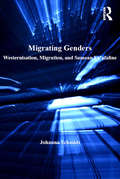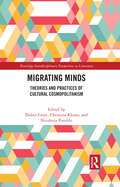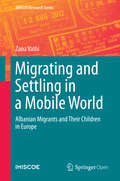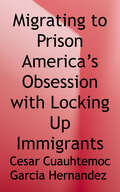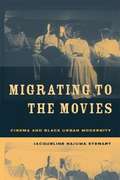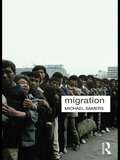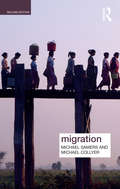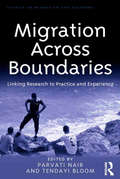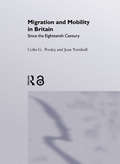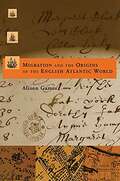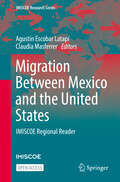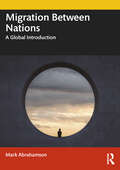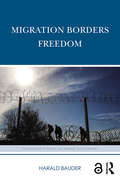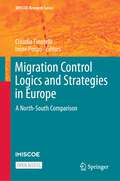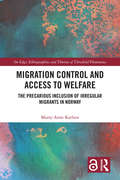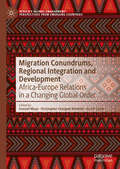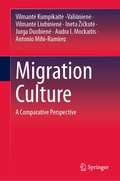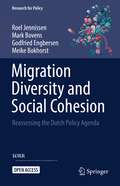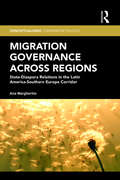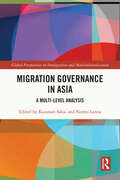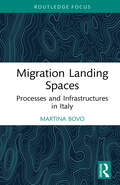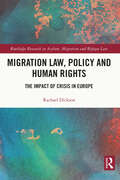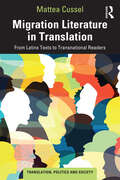- Table View
- List View
Migrating Genders: Westernisation, Migration, and Samoan Fa'afafine (Anthropology and Cultural History in Asia and the Indo-Pacific)
by Johanna SchmidtMigrating Genders presents a sustained description of male-to-female transgendered identities, explaining how the fa'afafine fit within the wider gender system of Samoa, and examining both the impact of Westernization on fa'afafine identities and lives, and the experiences of fa'afafine who have migrated to New Zealand. Informed by theories of sex, gender and embodiment, this book explores the manner in which the expression and understanding of non-normative gendered identities in Samoa problematizes dominant western understandings of the relationship between sex and gender. Drawing on rich empirical material, this book tells of both the diversity and the uniqueness of fa'afafine identities, aspects which fa'afafine have maintained in the face of Westernization, migration, and cultural marginalization in both Samoa and New Zealand. As such, in addition to anthropologists, it will be of interest to geographers, sociologists, and other readers with interests in gender and sexuality.
Migrating Minds: Theories and Practices of Cultural Cosmopolitanism (Routledge Interdisciplinary Perspectives on Literature)
by Didier CosteMigrating Minds contributes to the prominent interdisciplinary domain of Cosmopolitan Studies with twenty innovative essays by humanities scholars from all over the world that re-examine theories and practices of cosmopolitanism from a variety of perspectives. The volume satisfies the need for a stronger involvement of Comparative and World Literatures and Cultures, Translation, and Education Theories in this crucial debate, and also proposes an experimental way to explore in depth the necessity of a cosmopolitan method as well as the riches of cosmopolitan representations. The essays follow a logical progression from the situated philosophical and political foundations of the debate to interdisciplinary propositions for a pedagogy of cosmopolitanism through studies of modern and contemporary cosmopolitan cultural practices in literature and the arts and the concurrent analysis of prototypes of cosmopolitan identities. This trajectory allows readers to appreciate new historical, theoretical, aesthetic, and practical implications of cosmopolitanism that pertain to multiple genres and media, under different modes of production and reception. In the de-territorialized landscape of Migrating Minds, mental and sentimental mobility, rather than the legacy of place, is the key to an efficient, humanist response to deadening globalization.
Migrating Minds: Theories and Practices of Cultural Cosmopolitanism (Routledge Interdisciplinary Perspectives on Literature)
by Didier CosteAwarded the 2023 "René Wellek Prize for the Best Edited Essay Collection" by the American Comparative Literature Association, Migrating Minds contributes to the prominent interdisciplinary domain of Cosmopolitan Studies with 20 innovative essays by humanities scholars from all over the world that re-examine theories and practices of cosmopolitanism from a variety of perspectives. The volume satisfies the need for a stronger involvement of Comparative and World Literatures and Cultures, Translation, and Education Theories in this crucial debate, and also proposes an experimental way to explore in depth the necessity of a cosmopolitan method as well as the riches of cosmopolitan representations.The essays follow a logical progression from the situated philosophical and political foundations of the debate to interdisciplinary propositions for a pedagogy of cosmopolitanism through studies of modern and contemporary cosmopolitan cultural practices in literature and the arts and the concurrent analysis of prototypes of cosmopolitan identities. This trajectory allows readers to appreciate new historical, theoretical, aesthetic, and practical implications of cosmopolitanism that pertain to multiple genres and media, under different modes of production and reception. In the deterritorialized landscape of Migrating Minds, mental and sentimental mobility, rather than the legacy of place, is the key to an efficient, humanist response to deadening globalization.
Migrating and Settling in a Mobile World
by Zana VathiThis book draws on award-winning cross-generational research comparing the complex and life-changing processes of settlement among Albanian migrants and their adolescent children in three European cities: London (UK), Thessaloniki (Greece), and Florence (Italy). Building on key concepts from the social sciences and migration studies, such as identity, integration and transnationalism, the author links these with emerging theoretical notions, such as mobility, translocality and cosmopolitanism. Ethnic identities, transnational ties and integration pathways of the youngsters and adults are compared, focusing on intergenerational transmission in particular and recognizing mobility as an inherent characteristic of contemporary lives. Departing from the traditional focus on the adult children of settled migrants and the main immigration countries of continental North-Western Europe, this study centres on Southern Europe and Great Britain and a very recently settled immigrant group. The result is an illuminating early look at a second generation "in-the-making". Indeed, the findings provide ample grounds for pragmatic and forward-looking policy to enable these migrant-origin youngsters, and others like them, to more fully attain their potential. The book ends with a call to reassess the term "second generation" as it is currently used in policy and scholarly works. Children of migrants seldom see themselves as a particular and homogeneous group with ethnicity as an intrinsic identifying quality. More importantly, they make use of all the limited resources at their disposal, and view their integration processes through broader geographies - showing sometimes a cosmopolitan orientation, but also using localized reference points, such as the school, city, or urban neighbourhood.
Migrating to Prison: America's Obsession with Locking up Immigrants
by Cesar Cuauhtemoc Garcia HernandezFor most of America's history, we simply did not lock people up for migrating here. Yet over the last thirty years, the federal and state governments have increasingly tapped their powers to incarcerate people accused of violating immigration laws. As a result, almost 400,000 people annually now spend some time locked up pending the result of a civil or criminal immigration proceeding. In Migrating to Prison, leading scholar Cesar Cuauhtemoc Garcia Hernandez takes a hard look at the immigration prison system's origins, how it currently operates, and why.
Migrating to the Movies: Cinema and Black Urban Modernity
by Jacqueline Najuma StewartThe first comprehensive book on African Americans and early cinema, which takes Chicago and the Great Migration as its primary case study.
Migration
by Michael SamersIn the context of global security concerns, humanitarian crises and skill shortages migration and immigration have become central to economic, political and social debates at the beginning of the twenty-first century. And while migration and immigration have certainly not escaped the attention of social scientists, the study of both remains the most ‘under-serviced’ academic domain with respect to introductory texts. It is not surprising then that even fewer books have explored the contours of these social phenomena from an explicitly geographical perspective – in other words, in terms of ‘space’, ‘place’ and ‘scale’. Migration is an advanced, yet accessible, introduction to migration and immigration in a global context. It offers a critical, multi-disciplinary approach to the subject, borrowing from human geography, political science, social anthropology and sociology. However, unlike other broad volumes on the subject, it emphasizes a theoretical and conceptual approach to the study of migration. Specifically, Migration adopts a unique geographical approach by employing spatial concepts such as place, scale and territory. Using these spatial concepts, the author argues that most studies of migration begin with either an undue emphasis on nation-states as a lens on migration or on the contrary rely on exaggerated notions of transnationalism. Migration neither neglects the importance of nation states nor the significance of transnationalism, but it focuses on how local contexts matter to migration. The book covers such topics as migration categories, the explanation of different forms of migration, migration and employment, the geopolitics of migration and immigration and citizenship, rights, and belonging. This text is not simply an encyclopaedic overview of migration theories, trends and facts; rather, it is designed to have lasting intellectual value by providing particular arguments in each theme-based chapter. While it advocates certain arguments, it is also clearly written in an engaging and accessible manner for an undergraduate audience. Its clear structure is complemented by a combination of pedagogical features, such as case-study boxes, summary questions at the end of each chapter and a glossary. The book is designed for courses and modules on migration and immigration at the undergraduate and postgraduate levels and both students and academics will find it exceptionally useful.
Migration (Key Ideas in Geography)
by Michael Collyer Michael SamersWhile the subject of migration has received enormous attention in academic journals and books across the social sciences, introductory texts on the matter are few and far between. Even fewer books have explored migration through a critical and explicit engagement with spatial concepts. Now in its second edition, Migration remains the only text in more than a decade that emphasizes how geographical or spatial concepts can be used critically to understand migration. The multi-disciplinary text draws on insights from human geography, political science, social anthropology, sociology, and to a lesser extent economics. All of the chapters focus on key terms, theories, concepts, and issues concerning migration and immigration. The book argues that in the context of migration, two opposing ‘spatial positions’ have emerged in the wake of the critique of ‘methodological nationalism’. On one hand is the significance of ‘transnationalism’, and on the other, the importance of ‘sub-national’ or local processes. Both require more nuance and integration, while many of the concepts and theories which have thus far neglected space or have not been ‘treated’ spatially, need to be re-written with space in mind. Pedagogically the text combines a carefully defined structure, accessible language, boxes that explore case studies of migrant-related experiences in particular places, annotated suggestions for further reading, useful websites and relevant films and summary questions for student learning at the end of each chapter. Migration provides a critical, multi-disciplinary, advanced, and theoretically informed introduction to migration and immigration. Revised and updated with new material, new maps and illustrations and an accompanying website (https://migration2ndedition.wordpress.com/), it continues to be aimed at advanced undergraduates and Masters-level graduate students undertaking courses on migration and immigration.
Migration Across Boundaries: Linking Research to Practice and Experience (Studies in Migration and Diaspora)
by Tendayi Bloom Parvati NairBringing together scholars and practitioners from a range of disciplinary backgrounds working in Europe, North and South America, South Asia and the Middle East, this volume explores the question of how to ensure that migration research feeds back into improving the lives of migrants. It emphasises the necessarily interdisciplinary and cross-boundary nature of migration research, offering methodological recommendations to anyone studying or working in the field, and showing how migration studies can usefully affect real contexts by better exploring the potential that exists for both bridging academic disciplines and building links with work that occurs beyond strictly academic forums. Organised around the themes of methodological considerations and interdisciplinary approaches, the experiences of migrants as researchers and interaction between practitioners, policy-makers and academics, Migration Across Boundaries discusses the realities of the discourses that surround international migration, examining the proper role of academia in bringing together a range of stakeholders to formulate dialogic approaches to understanding migration. An international and interdisciplinary contribution to our understanding of how research in migration can be brought to bear on the experiences of migrants and linked to the work of activists, artists and policy-makers, this book will appeal not only to scholars and students of migration across the social sciences, but also to those working in the fields of migrant advocacy and activism.
Migration And Mobility In Britain Since The Eighteenth Century
by Jean Turnbull Colin PooleyPoplulation migration is one of the demographic and social processes which have structured the British economy and society over the last 250 years. It affects individuals, families, communities, places, economic and social structures and governments. This book examines the pattern and process of migration in Britain over the last three centuries. Using late 1990s research and data, the authors have shed light on migrations patterns including internal migration and movement overseas, its impact on social and economic change, and highlights differences by gender, age, family, position, socio-economic status and other variables.
Migration And The Origins Of The English Atlantic World (Harvard Historical Studies #133)
by Alison GamesEngland's seventeenth-century colonial empire in North America and the Caribbean was created by migration. The quickening pace of this essential migration is captured in the London port register of 1635, the largest extant port register for any single year in the colonial period and unique in its record of migration to America and to the European continent. Alison Games analyzes the 7,500 people who traveled from London in that year, recreating individual careers, exploring colonial societies at a time of emerging viability, and delineating a world sustained and defined by migration. The colonial travelers were bound for the major regions of English settlement--New England, the Chesapeake, the West Indies, and Bermuda--and included ministers, governors, soldiers, planters, merchants, and members of some major colonial dynasties--Winthrops, Saltonstalls, and Eliots. Many of these passengers were indentured servants. Games shows that however much they tried, the travelers from London were unable to recreate England in their overseas outposts. They dwelled in chaotic, precarious, and hybrid societies where New World exigencies overpowered the force of custom. Patterns of repeat and return migration cemented these inchoate colonial outposts into a larger Atlantic community. Together, the migrants' stories offer a new social history of the seventeenth century. For the origins and integration of the English Atlantic world, Games illustrates the primary importance of the first half of the seventeenth century.
Migration Between Mexico and the United States: IMISCOE Regional Reader (IMISCOE Research Series)
by Agustín Escobar Latapí Claudia MasferrerThis open access Regional Reader describes how Mexico - United States migration changed substantially during the first decade of the 21st Century. The book provides an in-depth analysis on the changes in the flows into and out of both countries, thus highlighting the issues arising from Mexico - US migration as well as addressing the large numbers of adults and children entering Mexico from the United States. It covers how this tidal change affects the Hispanic population of the U.S. and return migrants' reincorporation in Mexico; their jobs, access to school, health and access to health services, how fear became a dominant aspect of Mexicans’ lives in the U.S., and the role played by crime and social policy in Mexico.
Migration Between Nations: A Global Introduction
by Mark AbrahamsonFrom refugees fleeing wars or natural disasters to economic migrants pursuing better paid jobs abroad, international migration is an inescapable part of the modern world. Migration Between Nations: A Global Introduction provides a succinct and accessible overview of the varied types of migrants who cross national boundaries. Drawing upon a wide-ranging selection of case studies and the latest research findings, migration patterns and recent trends throughout the world are surveyed and summarized, with particular attention to movement from the global south to the global north. In a highly inter-disciplinary analysis, the social, cultural and economic integration of migrants and of their offspring in their new homelands are also explored. Employing approaches from a number of disciplines, the methods and techniques that researchers use to study various aspects of migration and integration are also explained. Migration Between Nations: A Global Introduction will be essential reading for students in a wide range of disciplines in the humanities and social sciences, including sociology, anthropology, ethnic studies, geography, global studies, history, and political science.
Migration Borders Freedom (Routledge Studies in Human Geography)
by Harald BauderInternational borders have become deadly barriers of a proportion rivaled only by war or natural disaster. Yet despite the damage created by borders, most people can’t – or don’t want to – imagine a world without them. What alternatives do we have to prevent the deadly results of contemporary borders? In today’s world, national citizenship determines a person’s ability to migrate across borders. Migration Borders Freedom questions that premise. Recognizing the magnitude of deaths occurring at contemporary borders worldwide, the book problematizes the concept of the border and develops arguments for open borders and a world without borders. It explores alternative possibilities, ranging from the practical to the utopian, that link migration with ideas of community, citizenship, and belonging. The author calls into question the conventional political imagination that assumes migration and citizenship to be responsibilities of nation states, rather than cities. While the book draws on the theoretical work of thinkers such as Ernst Bloch, David Harvey, and Henry Lefebvre, it also presents international empirical examples of policies and practices on migration and claims of belonging. In this way, the book equips the reader with the practical and conceptual tools for political action, activist practice, and scholarly engagement to achieve greater justice for people who are on the move.
Migration Control Logics and Strategies in Europe: A North-South Comparison (IMISCOE Research Series)
by Irene Ponzo Claudia FinotelliBuilding upon the concept of migration regime, this open access book brings together the works of scholars who have investigated logics and routines of action in the field of immigration control within a single and innovative theoretical framework. The chapters cover a wide range of policy domains, from visa policy to the externalisation of controls, labour migration to asylum, internal controls towards irregular migration to restrictions for intra-EU mobility. By unravelling organisational strategies and practices across Europe, the book does not only contribute to dismantling the very idea of the European North-South divide in migration but also shows how Europe really works in the field of migration in times of deep economic, asylum and health crises. In this perspective, the book questions the widespread understanding of migration control outcomes as simply the result of more or less effective state policies without considering the embeddedness of the national policy goals and strategies in the dynamic interplay of different economies, institutional cultures and geopolitical positions.
Migration Control and Access to Welfare: The Precarious Inclusion of Irregular Migrants in Norway (On Edge: Ethnographies and Theories of Threshold Phenomena)
by Marry-Anne KarlsenOver the past decades, European states have increasingly limited irregular migrants’ access to welfare services as a tool for migration control. Still, irregular migrants tend to have access to certain basic services, although frequently of a subordinate, arbitrary, and unstable kind. Drawing on in-depth ethnographic fieldwork conducted in Norway, this book sheds light on ambiguities in the state’s response to irregular migration that simultaneously cut through law, policy, and practice. Carefully examining the complex interplay between the geopolitical management of territory and the biopolitical management of populations, the book argues that irregularised migrants should be understood as precariously included in the welfare state rather than simply excluded. The notion of precarious inclusion highlights the insecure and unpredictable nature of the inclusive practises, underscoring how limited access to welfare does not necessarily contradict restrictive migration policies. Taking the situated encounters between irregularised migrants and service providers as its starting point for exploring broader questions of state sovereignty, biopolitics, and borders, Migration Control and Access to Welfare offers insightful analyses of the role of life, territory, and temporality in contemporary politics. As such, it will appeal to scholars of migration and border studies, gender research, social anthropology, geography, and sociology.
Migration Conundrums, Regional Integration and Development: Africa-Europe Relations in a Changing Global Order (Africa's Global Engagement: Perspectives from Emerging Countries)
by Inocent Moyo Christopher Changwe Nshimbi Jussi P. LaineThis book examines Africa-Europe relationships and intra-Africa relationships vis-à-vis migration. It analyses the African integration project that is being used to effectively manage migration within Africa and across its RECs, and harnessing it for development. The book presents debates related to the EU’s hardening and securitisation of its external border against migrants from Africa. It shows that migration actually challenges Africa-European relations, which is discussed as an important theme in this book. Authors in this book volume investigate several issues ranging from conundrums relating to migration between Africa and Europe to migration within Africa, but also in relation to borders and boundaries, its bearing on regional and continental integration and the significance of this in terms of relations between Africa and Europe. This book volume brings into conversation issues relating to the governance of migration for development, social cohesion and regional integration.
Migration Culture: A Comparative Perspective
by Vilmantė Kumpikaitė -Valiūnienė Vilmantė Liubinienė Ineta Žičkutė Jurga Duobienė Audra I. Mockaitis Antonio Mihi-RamirezThis book examines the emergence of a culture of migration through outward migration as a country-specific phenomenon and analyzes it from different perspectives, covering various aspects such as the history of a country, its migration flows, migration push factors, social, economic, and political issues, as well as individual values. In the first part, the authors present a theoretical background on migration culture formation. This is followed by an in-depth analysis of migration culture in Lithuania in the second part. The presented case study is based on a quantitative survey study of almost 5.400 respondents. Further, the results of this case study are compared and adapted to other classical migration countries in the European Union, such as Spain or Portugal.The book, therefore, is a must-read for everybody interested in a better understanding of migration and the emergence of a culture of migration in different countries.
Migration Diversity and Social Cohesion: Reassessing the Dutch Policy Agenda (Research for Policy)
by Godfried Engbersen Mark Bovens Roel Jennissen Meike BokhorstThis open access book shows policymakers which initiatives work when responding to the increasing diversity in cities, towns and neighborhood's. In recent times, policymakers have grappled with ways of responding to this increase, which has resulted in a plethora of policy initiatives, some more effective than others. Bringing together a large amount of research and evidence-based policy recommendations, this book offers both a sense of strategic direction as well as more specific, actionable advice. It brings together a remarkable mixture of policy areas that touch upon issues of diversity, immigration policy, education, and labour policy. It is of benefit and importance to all those making policies for a country with increasing immigration.
Migration Governance across Regions: State-Diaspora Relations in the Latin America-Southern Europe Corridor (Conceptualising Comparative Politics)
by Ana MargheritisMigration policies are rarely effective. Examples of unintended and undesirable outcomes abound. In Latin America, very little is known about the impact and long-term sustainability of state policies towards emigrants. Following a world-wide trend, Ecuador, Uruguay, Mexico, Argentina, and Brazil have developed new institutions and discourses to strengthen links; assist, protect and enfranchise migrants, and capture their resources. As an adaptation of governmental techniques to global realities, these policies redefine the contours of polities, nations, and citizenship, giving place to a new form of transnational governance. Building upon field research done in these five states and two receiving countries in the last decade, Ana Margheritis explains the timing, motivations, characteristics, and implications of emigration policies implemented by each country, as well as the emergence of a distinctive regional consensus around a post-neoliberal approach to national development and citizenship construction. Margheritis argues that these outreach efforts resemble courting practices. Courting is a deliberate expression of the ambivalent, still incipient, and open-ended relationship between states and diasporas which is not exempt of conflict, detours, and setbacks. For various reasons, state-diaspora relations are not unfolding into stable and fruitful partnerships yet. Thus, she makes "diaspora engagement" problematic and investigates to what extent courting might become engagement in each case. Studying emigration policies of five Latin American countries and migrant responses in Southern Europe sheds light on the political dynamics and governance mechanisms that transnational migration is generating across regions. It illuminates possible venues to manage multiple engagements of migrants with societies at both ends of their migration journey and unveils the opportunities for states and non-state actors to cooperatively manage of migration flows.
Migration Governance in Asia: A Multi-level Analysis (Global Perspectives on Immigration and Multiculturalisation)
by Kazunari SakaiThe contributors to this book investigate migration governance in Asia through a multilevel analysis, addressing its local, national and regional dimensions as well as placing it in the wider context of global migration governance. Core case studies include migration to and within Japan, the migration of Burmese and Tibetan refugees to India, and the Rohingya crisis in Myanmar. Evaluating the rules, norms and processes put in place by state and non-state actors to cope with international migration, the contributors focus especially on migration flows and the extent to which Asian cases are distinct from those elsewhere. This includes comparative cases from Europe and the United States to provide a comparative context for the analysis of Asia. A valuable resource for students and scholars of migration studies, especially those with a particular interest in Asia.
Migration Italy
by Graziella ParatiIn terms of migration, Italy is often thought of as a source country - a place from which people came rather than one to which people go. However, in the past few decades, Italy has indeed become a destination for many people from poor or war-torn countries seeking a better life in a stable environment. Graziella Parati's Migration Italy examines immigration to Italy in the past twenty years, and explores the processes of cultural hybridization that have occurred.Working from a cultural studies viewpoint, Parati constructs a theoretical framework for discussing Italy as a country of immigration. She gives special attention to immigrant literature, positing that it functions as an act of resistance, a means to talk back to the laws that regulate the lives of migrants. Parati also examines Italian cinema, demonstrating how native and non-native filmmakers alike create parallels between old and new migrations, complicating the definitions of sameness and difference.These definitions and the complexities inherent in the different cultural, legal, and political positions of Italy's people are at the heart of Migration Italy, a unique work of immense importance for understanding society in both modern-day Italy and, indeed, the entire European continent.
Migration Landing Spaces: Processes and Infrastructures in Italy (Routledge Studies in Development, Mobilities and Migration)
by Martina BovoThis book looks at migrant landing spaces, exploring the processes and infrastructures which people encounter as they navigate urban spaces along the central Mediterranean route.The book argues that there remains a theoretical and practical difficulty in grasping the complexity of migrant arrivals. Migrants are often unsure whether they will stay or leave, their mobility is uncertain. Despite this, they face rigid binaries and categories within administrative policy and planning which tries to pin them down as either permanent or temporary. Drawing on extensive original research in southern Italy, this book suggests that we should instead think of ‘landing spaces’: parts of the city that work as infrastructures for landing, that allow for an open and dynamic use of the urban space and provide opportunities for encounter and information exchange as migrants consider their next steps.Combining an ethnographic gaze with insights from urban planning, architecture, geography, social sciences and migration studies, this book invites us to look closer at the interactions between people, practices and places as migrants land in Europe.
Migration Law, Policy and Human Rights: The Impact of Crisis in Europe (Routledge Research in Asylum, Migration and Refugee Law)
by Rachael DicksonMigration is one of the greatest societal challenges of our time. It has many facets, from mass movements to escape war, climate, or human rights abuses to the search for economic opportunity and prosperity. Illicit industries facilitate border crossings at the expense of safety, and governments face problems of processing and integrating new arrivals. These challenges have had a profound impact in Europe, calling into question central values of solidarity and human rights. This book analyses the law and policy of migration in the European Union (EU) and its relationship to understandings of the EU as an international human rights actor. It examines the role crisis plays in determining the priorities of migration policy and the impact political exigencies have on the rights of migrants. This book problematises the EU Area of Freedom, Security, and Justice as a ‘home.’ Taking a governmentality approach to critique discourse, the idea of a holistic approach is deconstructed to explore notions of wellness, resilience, responsibilisation and externalisaton. The EU’s pursuit of a holistic approach to managing migration in crisis indicates problems with EU solidarity, and the tactics employed to bring the crisis under control reveal security concerns that provoke questions about the EU as an international human rights actor. Both this framework for analysis and the empirical findings make a significant contribution to how the migration crisis can be theorised using adaptable conceptual tools. Under this form of governance, migration becomes a phenomenon to be treated so that its symptoms are ameliorated. This book will be of interest to students and scholars of the EU, migration, and human rights as well as policymakers, commentators, and activists in these areas.
Migration Literature in Translation: From Latinx Texts to Transnational Readers (Translation, Politics and Society)
by Mattea CusselMigration Literature in Translation explores the unique case of Latinx literature translated into Spanish, drawing from Latinx studies, sociology, political philosophy and cultural studies. The book focuses on works by Helena María Viramontes, Achy Obejas, Daisy Hernández and Junot Díaz, analysing migration literature and translation as a social practice. Cussel introduces the ‘integrated translation critique’, a new methodology that examines the transformation of texts through translation and their reception, while incorporating empirical social research methods. This innovative approach highlights the roles of various actors—scholars, translators, authors, reviewers, and readers— in shaping Latinx literary texts’ mobility and meaning across languages and cultures.Through qualitative research including focus groups, questionnaires and fieldwork in Europe, Latin America and the US, Cussel sheds light on how transnational readers engage with translated migrant stories. By addressing the cultural, social and political dimensions of translation, this interdisciplinary work offers a sociological perspective on literary translation. It is essential reading for scholars and students in the sociology of translation, Latinx and migration literature, and migration studies.
